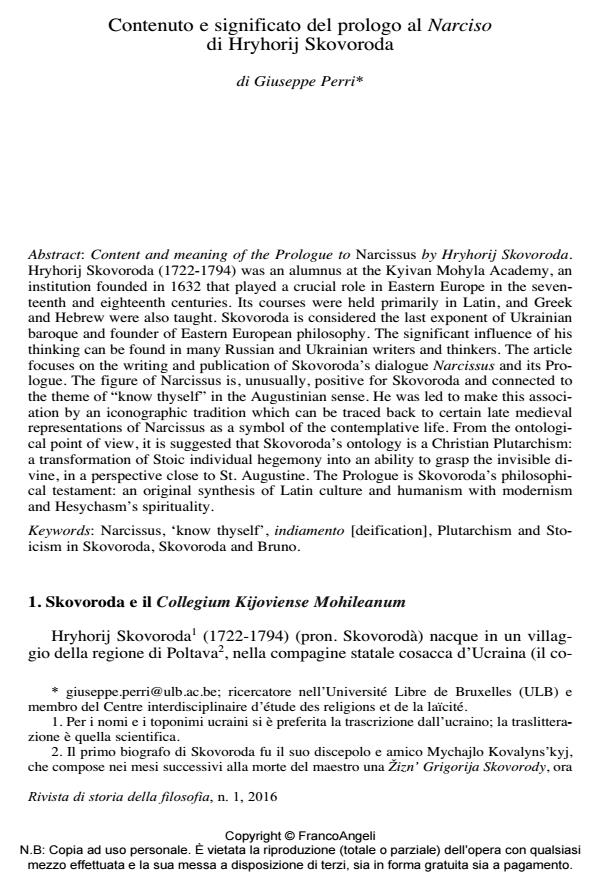Content and meaning of the Prologue to Narcissus by Hryhorij Skovoroda
Journal title RIVISTA DI STORIA DELLA FILOSOFIA
Author/s Giuseppe Perri
Publishing Year 2016 Issue 2016/1
Language Italian Pages 22 P. 25-46 File size 559 KB
DOI 10.3280/SF2016-001002
DOI is like a bar code for intellectual property: to have more infomation
click here
Below, you can see the article first page
If you want to buy this article in PDF format, you can do it, following the instructions to buy download credits

FrancoAngeli is member of Publishers International Linking Association, Inc (PILA), a not-for-profit association which run the CrossRef service enabling links to and from online scholarly content.
Hryhorij Skovoroda (1722-1794) was an alumnus at the Kyivan Mohyla Academy, an institution founded in 1632 that played a crucial role in Eastern Europe in the seventeenth and eighteenth centuries. Its courses were held primarily in Latin, and Greek and Hebrew were also taught. Skovoroda is considered the last exponent of Ukrainian baroque and founder of Eastern European philosophy. The significant influence of his thinking can be found in many Russian and Ukrainian writers and thinkers. The article focuses on the writing and publication of Skovoroda’s dialogue Narcissus and its Prologue. The figure of Narcissus is, unusually, positive for Skovoroda and connected to the theme of "know thyself" in the Augustinian sense. He was led to make this association by an iconographic tradition which can be traced back to certain late medieval representations of Narcissus as a symbol of the contemplative life. From the ontological point of view, it is suggested that Skovoroda’s ontology is a Christian Plutarchism: a transformation of Stoic individual hegemony into an ability to grasp the invisible divine, in a perspective close to St. Augustine. The Prologue is Skovoroda’s philosophical testament: an original synthesis of Latin culture and humanism with modernism and Hesychasm’s spirituality.
Keywords: Narcissus, ‘know thyself’, indiamento [deification], Plutarchism and Stoicism in Skovoroda, Skovoroda and Bruno
- The Evolution of Gregory Skovoroda’s Philosophical Views as related to his Spiritual Biography Victor Chernyshov, in Sententiae /2018 pp.65
DOI: 10.22240/sent37.01.065
Giuseppe Perri, Contenuto e significato del prologo al Narciso di Hryhorij Skovoroda in "RIVISTA DI STORIA DELLA FILOSOFIA" 1/2016, pp 25-46, DOI: 10.3280/SF2016-001002